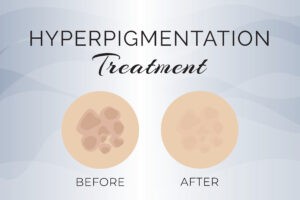
Hyperpigmentation is a common skin condition that causes dark patches due to excess melanin production. It can be triggered by sun exposure, hormonal changes (like those during pregnancy), or inflammation from acne or injury. While these dark spots are harmless, they can affect your confidence and make achieving an even skin tone more difficult.
Laser treatments offer an advanced solution to help diminish hyperpigmentation by targeting the excess melanin responsible for dark spots. With various types of lasers available, knowing which one is most effective for your skin type and pigmentation concerns is key to getting the best results.
Understanding Laser Treatments for Hyperpigmentation
Laser treatments work by delivering focused light energy to the areas of hyperpigmentation. This energy targets the melanin in dark spots, breaking it down so the body can gradually eliminate it. The goal is to reduce the visibility of dark spots and create a more even skin tone over time.
However, not all lasers are created equal, and it’s important to choose the right laser based on your skin type, tone, and the severity of your pigmentation. Some lasers are more effective for lighter skin tones, while others are designed to treat darker skin without causing unwanted side effects.
Types of Lasers for Hyperpigmentation
Several laser options are available for treating hyperpigmentation, each with its strengths depending on the type and severity of your dark spots:
1. Q-Switched Lasers
Q-switched lasers, such as Nd
, Ruby, and Alexandrite lasers, are commonly used to treat hyperpigmentation. These lasers emit short bursts of energy, targeting excess melanin without damaging the surrounding skin.
- Nd:YAG: This laser is ideal for treating deeper pigment and is safe for most skin types, including darker tones. It’s often used for conditions like melasma or post-inflammatory hyperpigmentation.
- Ruby: Best suited for lighter skin tones, the Ruby laser effectively breaks down superficial pigmentation. It’s commonly used for freckles and age spots.
- Alexandrite: This laser is also effective for lighter skin tones and can address both superficial and deeper pigmentation issues.
2. Picosecond Lasers
Picosecond lasers are a newer option and work by delivering ultra-short pulses of energy to the skin. This type of laser is highly effective in treating hyperpigmentation because it breaks down the melanin in smaller particles, allowing for faster removal by the body. Picosecond lasers can treat a variety of skin tones with minimal downtime, making them a versatile choice for individuals with dark spots of varying depth and severity.
3. Fractional Lasers
Fractional lasers, such as fractional CO2 or Erbium lasers, are another option for treating hyperpigmentation. These lasers work by creating micro-injuries in the skin, stimulating collagen production and promoting the turnover of damaged skin cells. This treatment can improve the appearance of dark spots while also rejuvenating the skin. Fractional lasers are typically recommended for more extensive hyperpigmentation issues or when combined with anti-aging treatments.
Choosing the Best Laser for Your Dark Spots
When determining the best laser treatment for your hyperpigmentation, several factors need to be taken into consideration:
Skin Type and Tone
Your skin tone plays a crucial role in selecting the appropriate laser. Certain lasers, such as the Nd, are better suited for darker skin tones, as they are less likely to cause pigmentation changes or burns. Other lasers, like Ruby or Alexandrite, are more effective on lighter skin but may not be safe for individuals with darker complexions. It’s essential to choose a laser that is compatible with your skin type to avoid potential complications.
Type and Severity of Hyperpigmentation
Different types of hyperpigmentation, such as melasma, age spots, or post-inflammatory dark spots, may require different laser treatments. For instance, superficial pigmentation can often be addressed with Q-switched or fractional lasers, while deeper pigmentation issues may benefit more from Picosecond or Nd lasers.
Treatment Goals and Expectations
Consider your goals—whether you’re looking for a significant reduction in dark spots or a complete skin overhaul. Discussing your expectations with a skilled provider is key to selecting the right treatment. Some lasers may require multiple sessions to achieve your desired results, while others may provide quicker outcomes with fewer treatments.
Potential Side Effects and Downtime
Different lasers come with varying levels of downtime and risk of side effects. While most laser treatments involve mild redness or swelling post-procedure, certain lasers may cause more pronounced peeling or sensitivity. Choosing the right laser will depend on your lifestyle, as some treatments may require you to avoid sun exposure or take time off from daily activities.
Combining Laser Treatments with Other Therapies
While lasers are powerful tools for treating hyperpigmentation, combining them with other treatments can enhance your results. Some complementary therapies include:
Chemical Peels
Chemical peels can accelerate skin cell turnover, helping to fade hyperpigmentation more quickly. When used in conjunction with laser treatments, peels can help maintain your results and prevent the reappearance of dark spots.
Topical Creams
Prescription-strength creams containing ingredients like hydroquinone, retinoids, or vitamin C can further reduce the appearance of dark spots by brightening the skin and preventing melanin production. Incorporating these into your post-laser skincare routine can amplify your results.
Microdermabrasion
Microdermabrasion is a physical exfoliation technique that can be used alongside laser treatments to enhance skin texture and tone. By removing dead skin cells, microdermabrasion allows the laser’s effects to penetrate deeper and improve overall results.
Conclusion
Laser treatments are a highly effective way to combat hyperpigmentation and restore a more even skin tone. With multiple laser options available, selecting the right one depends on your skin type, the severity of your dark spots, and your treatment goals. Combining laser treatments with other therapies can further enhance your results, giving you smoother, brighter skin.
At Nuveau Plastic Surgery, we specialize in personalized laser treatments tailored to your unique skin needs. If you’re ready to achieve a more even and radiant complexion, schedule a consultation with our experienced team today. Together, we’ll develop a customized plan that targets your pigmentation concerns and helps you feel confident in your skin. Explore our patient testimonials and before-and-after gallery to see the incredible transformations we’ve achieved!

